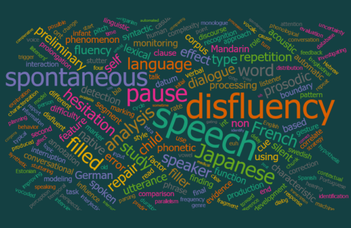Diszfluencia a spontán beszédben

2019. szeptember 12. - 2019. szeptember 14.
1088 Budapest, Múzeum krt. 4/A • Kari tanácsterem
2019. szeptember 12. - 2019. szeptember 14.
1088 Budapest, Múzeum krt. 4/A • Kari tanácsterem
What is most often called disfluency– i.e. pauses, hesitations, prolongations, truncations, repetitions, self‑repairs and similar – in normal spontaneous speech presents challenges for researchers in many different fields, ranging from speech production and perception in psychology, to conversational analysis and automatic speech recognition in speech technology.
Day 1 • September 12
10:00–10:15 Welcome session
Morning
• Session Chair: Robert Eklund
10:15–11:00 Invited Speaker 1: Helena Moniz: Processing disfluencies in distinct speaking styles: idiosyncrasies and transversality
Theme: Production models 1
11:00–11:30 Kikuo Maekawa: Five pieces of evidence suggesting large lookahead in spontaneous monologue
11:30–12:00 Simon Betz & Loulou Kosmala: Fill the silence! Basics for modelling hesitation
12:00–12:30 Hong Zhang: Variation in the choice of filled pause: A language change, or a variation in meaning?
12:30–14:00 Lunch (included in the registration fee)
Afternoon
Theme: Production and perception
• Session Chair: Judit Kormos
14:00–14:30 Ralph L. Rose: The structural signalling effect of silent and filled pauses
14:30–15:00 Iulia Grosman, Anne Catherine Simon, & Liesbeth Degand: Empathetic hearers perceive repetitions as less disfluent, especially in non-broadcast situations
15:00–15:30 Dorottya Gyarmathy & Viktória Horváth: Pausing strategies with regard to speech style
15:30–16:00 Coffee (included in the registration fee)
Theme: Applied linguistics (second language acquisition and speech technology)
• Session Chair: Mária Gósy
16:00–16:30 Shungo Suzuki & Judit Kormos: The effects of read-aloud assistance on second language oral fluency in text summary speech
16:30–17:00 Kata Baditzné Pálvölgyi: Hesitation patterns in the Spanish spontaneous speech of Hungarian learners of Spanish
17:00–17:30 Charlotte Bellinghausen, Thomas Fangmeier, Bernhard Schröder, Johanna Keller, Susanne Drechsel, Peter Birkholz, Ludger Tebartz van Elst, Andreas Riedel: On the role of disfluent speech for uncertainty in articulatory speech synthesis
18:00 Welcome Drink (included in the registration fee)
Day 2 • September 13
Morning
• Session Chair: Kikuo Maekawa
10:00–10:45 Invited Speaker 2: Mária Gósy: Halt command in word retrieval
Theme: Production models 2
10:45–11:15 Michiko Watanabe, Yusaku Korematsu, & Yuma Shirahata: “Uh” is preferred by male speakers in informal presentations in American English
11:15–11:45 Vered Silber-Varod, Mária Gósy, & Robert Eklund: Segment prolongation in Hebrew
11:45–12:15 Thanaporn Anansiripinyo & Chutamanee Onsuwan: Acoustic-phonetic characteristics of Thai filled pauses in monologues
12:15–14:00 Lunch (included in the registration fee)
Afternoon
Theme: Age specific characteristics of disfluencies
• Session Chair: Michiko Watanabe
14:00–14:30 Linda Taschenberger, Outi Tuomainen, & Valerie Hazan: Disfluencies in spontaneous speech in easy and adverse communicative situations: the effect of age
14:30–15:00 Valéria Krepsz: Vowel lengthening – Effect of position, age, and phonological quantity
15:00–15:30 Mária Laczkó: Temporal characteristics of teenagers’s spontaneous speech and topic based narratives produced during school lessons
15:30–16:00 Borbála Keszler & Judit Bóna: Pausing and disfluencies in elderly speech: Longitudinal case studies
16:00–16:30 Coffee (included in the registration fee)
Theme: Applied linguistics (interpreting and clinical linguistics)
• Session Chair: Ágnes Jordanidisz
16:30–17:00 Mária Bakti: Error type disfluencies in consecutively interpreted and spontaneous monolingual Hungarian speech
17:00–17:30 Johanna Pap: Effects of speech rate changes on pausing and disfluencies in cluttering
17:30–18:00 Julianna Jankovics & Luca Garai: Disfluencies in mildly intellectually disabled young adults’ spontaneous speech
19:00 Sightseeing and dinner (additional fee)
Special Day • September 14
Morning
• Session Chair: Vered Silber-Varod
9:30–10:15 Invited Speaker 3: Melissa A. Redford: Implications of a developmental approach for understanding spoken language production
10:15–10:45 Ivana Didirkova, Christelle Dodane, & Sascha Diwersy: The role of disfluencies in language acquisition and development of syntactic complexity in children
10:45–11:15 Viktória Horváth & Valéria Krepsz: Filled pauses in children’s spontaneous speech – aspects from timing and complexity
11:15–11:45 Mária Gósy: Filler words in children’s and adults’ spontaneous speech
12:00–13:30 Lunch (included in the registration fee)
Afternoon
• Session Chair: Ralph L. Rose
13:30–14:00 Yi-Fen Liu & Shu-Chuan Tseng: Word Use and Word-level Reduction in Story-telling Speech of Chinese-speaking Hearing and Hearing-impaired Children
14:00–14:30 Alexandra Markó, Tamás Gábor Csapó, Márton Bartók, Tekla Etelka Gráczi, & Andrea Deme:Patterns of lingual CV coarticulation in Hungarian children’s speech: The case of stops
14:30–15:00 Mária Laczkó: Characteristics of disfluences in teenagers’ spontaneous speech and topic based narratives created during school lessons
15:00–15:30 Coffee (included in the registration fee)
• Session Chair: Viktória Horváth
15:30–16:00 Judit Bóna: Self-monitoring in children’s speech
16:00–16:30 Tímea Vakula & Éva Szennay: Speech rate and pausing in schoolchildren’s speech
16:30–17:00 Ágnes Jordanidisz, Orsolya Mihály, & Judit Bóna: Temporal aspects of disfluencies in picture-elicited story telling before and after intervention during the dynamic assessment of children’s narrative skills
17:00–17:10 Closing session

